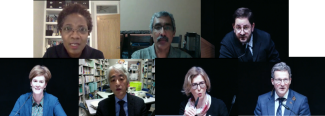
Amidst the challenges of an ongoing global pandemic, SMU has continued to collaborate actively with its network of overseas partner institutions. How has the University done this in the face of COVID-19 restrictions on international travel and in-person interactions? By staying nimble and embracing new ways of engagement.
These views were articulated by Prof Venky Shankararaman, SMU’s Vice Provost (Education), at the annual Reinventing Higher Education Conference, a two-day event held from 15 to 16 Nov 2021. This year’s theme, “Global Engagement: Towards Responsive and Innovative Universities”, centred on higher education’s role in promoting positive change and innovation in society. Co-organised by IE University and Luiss University, the hybrid event took place online and in Rome, Italy, bringing together more than 35 experts and distinguished participants from the academia, and private and public sectors.
Prof Shankararaman represented SMU as a panellist at a discussion themed “Responsive Higher Education: Towards Collaborative Initiatives” on 16 Nov. His fellow panellists in the 45-minute-long discourse included King’s College London’s Vice President (Global Engagement), Prof Funmi Olonisakin; Hitotsubashi University’s President, Prof Satoshi Nakano; Maastricht University’s Director of the YUFE Alliance, Dr Daniela Trani; Sciences Po’s Acting Vice President for International Affairs, Ms Kate Vivian; and QS’ Founder and CEO, Mr Nunzio Quaquarelli. The session was moderated by IE University’s Provost, Prof Manuel Muñiz.
Citing the Virtual Student Exchange programme in Term 2 Academic Year 2020/2021 as a case in point, Prof Shankararaman said that close cross-border cooperation with partner universities in Asia and Europe had enabled SMU to continue to offer students enriching global exposure experiences, at a time when overseas mobility programmes were suspended.
SMU also adopted alternative approaches for symposiums and workshops, such as the ones organised by the ASEAN University Network-Technology-Enhanced Personalised Learning Thematic Network. SMU, with Thailand’s Mahidol University and Malaysia’s University of Malaya, co-leads the Network. Prof Shankararaman highlighted that pivoting effectively to a virtual format for these events had made it possible for hundreds of educators from ASEAN universities to convene, border restrictions notwithstanding, to share best practices and discuss collaborative opportunities.
Prof Nakano shared Hitotsubashi University’s experience collaborating with fellow member universities of the Societal Impact and Global Management Alliance (SIGMA), including SMU, for the SIGMA Global Virtual Course. He said this year’s run of the online, inter-university course was especially timely, as it created global exposure opportunities for students amid pandemic circumstances, to engage in discussion on how the Sustainability Development Goals have impacted communities.
Despite headwinds from the COVID-19 pandemic, and geo-political tensions in some parts of the world, Prof Shankararaman urged universities to press on with cross-border collaborations. He asserted that that such cooperation had provided the needed platforms and opportunities for the exchange of ideas and perspectives, as well as for expertise and information sharing. This was not only critical for the conduct of rigorous and impactful transnational research to improve the world we live in, but from the academic perspective, it also opened up opportunities for universities to jointly develop curriculum, he added.
Prof Shankararaman was participating at the Conference in line with SMU’s strategic priority area of “Growth in Asia”, where the University sought to offer a deep understanding of Asia’s economy, polity and society.